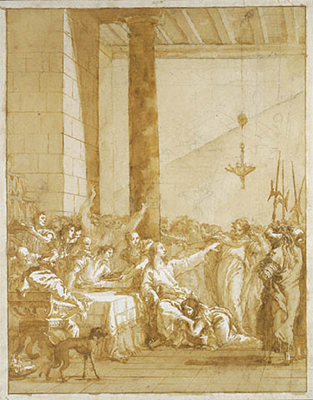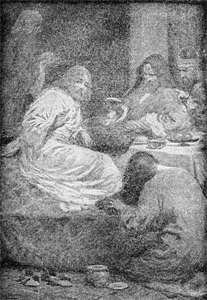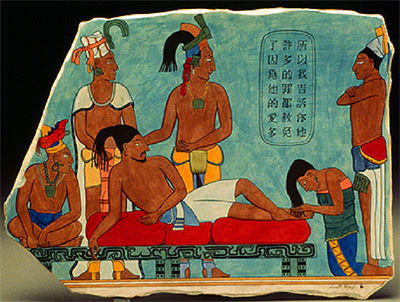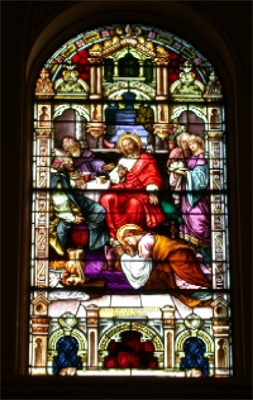
Christmas
Easter
Pentcoest
All Saints
Christ The King
Confirmation
Palm/Passion
Reformation
Stewardship
Books of the Bible
Lenten Series
Christmas Dramas
Videos
Series A - Matthew
Series B - Mark
Series C - Luke
Series D - Other
To contact
Edward F. Markquart
info@sfs.com

Series C PENTECOST 3C Luke 7:36-50 SYNOPSIS OF THE FOUR GOSPELS, Kurt Aland, English Edition, p. 104-106. This Bible study is from THE LIFE OF CHRIST: A Study in the Four Gospels. This free 54 week course for the laity will be available for congregations beginning in 2007. #114. The Woman With The Ointment Notice that we seem to have three versions of this story. Notice that Luke places this story in an anti-Pharisee section. Matthew and Mark’s versions are very similar and are parallel in almost every way. Luke has such a different version of this story. That is, this story in Luke is told in a completely different way than Matthew and Mark. You would have thought that Luke would have included the story of a woman preparing Jesus for burial by anointing his head with oil near the close of the Jesus story, but Luke inserts his version of the story here in an anti-Pharisee section. John has a version of the story that is similar to Matthew and Mark’s. That is, both stories occur in Bethany. Both stories say that the value of the ointment is three hundred denarii or three hundred day’s wages. Both stories say that the woman’s pouring of the ointment was preparing Jesus for burial. But John’s story is so different in that the characters of Mary, Martha and Lazarus are named; Mary is the person who anoints Jesus’ feet (not head) with oil; Judas, the keeper of the treasury bag and a thief, is worried about money that could have gone to the poor. Remember that Luke is a master story teller (e.g. the Good Samaritan, The Rich Man and Lazarus, Mary and Martha, etc.). Many scholars conclude that Luke is one of the best short story “tellers” ever to have lived. Luke’s short stories are superb, including this one. This story is one of the grand stories of the Bible and deserves to be studied in depth in each of the three settings (Matthew/Mark, Luke, and John). We will now walk through Luke’s version of this story and use the insights from the sermon below. Much later in this course, as we study the final week of Jesus’ life, we will study Matthew/Mark and John’s version of this story. -One of the Pharisees asked Jesus to eat with him, and he went into the Pharisee's house and took his place at the table. The Pharisees. Let us carefully look at the word, "Pharisees." The Pharisees were self righteous people with blown up moral and spiritual feelings of superiority. They were not pastors. They were not priests. They were lay leaders who were stuffy with self religious pride. They had this fundamental problem that they maximized every body else’s faults and minimized their own. Could they focus on your sins! They were experts at looking at everybody else’s sins. They, too, felt that they were one, two or three cuts above everybody else in the world. To understand the story better, we need to understand Jesus’ running conflict with the Pharisees. Jesus said to the Pharisees that “prostitutes and tax collectors will go into the kingdom of God before you Pharisees.” So Jesus had this running conflict with the Pharisees. The Pharisees and their self righteous attitudes were always "butting heads" with Jesus. In the story for today, we discover that Jesus was invited to the home of none other than Simon the Pharisee. Jesus was invited to the home of a Pharisee, the Pharisees whom Jesus had recently insulted and told that sinners and prostitutes would enter the Kingdom of heaven before they would. In other words, the scene is set for another "bloody battle" of words and wits with the Pharisees. Jesus was invited into the home of Simon the Pharisee for a banquet. Let’s pause for a moment. Jesus would have been invited into Simon’s home which means he would have been invited into a large open courtyard of the house. The people there were not merely having a dinner; they were having a banquet. A banquet meant that the table was laden with food and the home was filled with people, important people. Jesus was a well known "religious big shot" by then. It would be like having Billy Graham come to dinner, and that would have been very special. To have the most famous rabbi in the country come to dinner was very special and everyone would have been excited…and nervous at the same time, because of the earlier conflicts that Jesus had had with many of guests whom we assume were Pharisees. Jesus knew who he was dealing with as he approached the house of Simon the Pharisee. Jesus came into the courtyard of Simon the Pharisee. Simon greeted him, but did not give Jesus some of the common expected courtesies. Normally, when a guest arrived in your home,the host would embrace them, hug them, touch them in a friendly way. But Simon did none of these. That was strange. That was being aloof and cool towards Jesus. When Jesus came in, Simon normally would have offered Jesus water with which to bath his feet or have a servant girl wash his feet. Simon offered neither. No water for Jesus. And normally, Simon would have offered olive oil to soothe Jesus’ hands and feet, but Simon did not offer him olive oil either. So there was a definite coolness from Simon towards Jesus. -And a woman in the city, who was a sinner, having learned that he was eating in the Pharisee's house, brought an alabaster jar of ointment. She stood behind him at his feet, weeping, and began to bathe his feet with her tears and to dry them with her hair. Then she continued kissing his feet and anointing them with the ointment. In this scene, a woman who seems to be a prostitute comes in behind Jesus and she kneels at his feet. She kneels at his feet and she begins crying, crying not a little bit. She cries so much that her tears actually wet Jesus’ feet. She then takes her hair which would have been braided around her head, long, dark, brown hair, and she unbraids it and lets it down and starts to wash Jesus’ feet with her tears and hair. People were stunned. People were speechless. No one knew what to say. The woman was doing something which was totally inappropriate, letting down her hair like that in public, crying her tears over Jesus’ feet. It was all so improper, so offensive, so borderline disgusting. It violated the rules of civil etiquette. And then this woman starts kissing his feet. How strange. But not so strange to people who understood in Jewish custom that if somebody have saved your life, you would come to that person and kiss his feet. So that she was kissing Jesus’ feet implies and reveals that Jesus may have rescued her earlier. If someone has saved you, a way to acknowledge that is to come and kiss that person's feet. Perhaps, Jesus had saved her from prostitution. All at the banquet are perplexed and speechless at her behavior. -Now when the Pharisee who had invited him saw it, he said to himself, This Pharisee was thinking his thoughts to himself, not wanting Jesus to know what he was feeling, how deeply he was condemning this woman, this adulteress, this piece of sexual scum. "If this man were a prophet, he would have known who and what kind of woman this is who is touching him—that she is a sinner." The text then says to the effect, “ If Jesus was truly a prophet, he would realize what kind of woman this was. He would know what was inside her heart. He would know what a terrible sinner she was and Jesus should have nothing to do with her.” And Jesus, being a prophet and reading Simons’s heart, knew that Simon’s heart was filled with smug self righteousness and cutting condemnation. Simon was looking down his nose at this woman for Simon felt that he was several cuts above her. -Jesus spoke up and said to him, "Simon, I have something to say to you." Oh, oh, We can feel it coming. Yes, we can sense that Simon is going to get an earful as he hears a Word from the Lord. We can hear it coming because we know the story. But Simon, he didn't. He thought his inner convictions were known only to himself. He naively asks Jesus to continue. -"Teacher," he replied, "speak." -"A certain creditor had two debtors; one owed five hundred denarii, and the other fifty. When they could not pay, he canceled the debts for both of them. Now which of them will love him more?" Jesus, knowing what was in Simon’s heart, then said to Simon. “Simon, I need to tell you a story. There once were two men and they were both in debt to a money lender, a banker. The one was in debt five hundred denarii or five hundred days of wages. That is being deeply in debt, to owe someone almost two years of wages. The second man was in debt for fifty denarii or fifty days of wages, less than two months of wages. The money lender forgave both people their debts. Now, which of the two would be more appreciative to the money lender?” -Simon answered, "I suppose the one for whom he canceled the greater debt." Simon the Pharisee said, “The one who was forgiven the most, I suppose.” I love the intonation of the words, “I suppose.” -And Jesus said to him, "You have judged rightly." -Then turning toward the woman, he said to Simon, "Do you see this woman? I entered your house; you gave me no water for my feet, but she has bathed my feet with her tears and dried them with her hair. Jesus, looking at the woman, said to Simon, “Simon, I came into your house and you gave me no water for my feet but she has been bathing my feet with her tears. I came into your house and you did not welcome me with a warm embrace but she has been kissing my feet. I came into your house and you did not give me oil to anoint my hands and feet, but she has been anointing my feet with precious oil.” -You gave me no kiss, but from the time I came in she has not stopped kissing my feet. -You did not anoint my head with oil, but she has anointed my feet with ointment. -Therefore, I tell you, her sins, which were many, have been forgiven; hence she has shown great love. But the one to whom little is forgiven, loves little." Jesus then added these profound words, “The person who has been forgiven much, loves much. A person who has been forgiven much, has much compassion in their heart.” Whoever is forgiven much, loves much. Whoever is forgiven little, loves little.” Wow. What words. The Word of the Lord. So true. So applicable to our own lives. How do we finally learn these words? Little "being forgiven" means little love for others who need forgiveness. What a profound law of human relationships. If a person has not personally experienced great forgiveness himself or herself, it becomes more difficult to extend forgiveness to another person who needs it. When a person realizes the number of stupid mistakes one has made in own's own life, then that person is more willing for forgive others who make similar stupid mistakes in their life. -Then he said to her, "Your sins are forgiven." Jesus forgave the woman’s sin and that action would upset the Pharisees. The Pharisees believed that according to their interpretation of the Old Testament, only God had the power and authority to forgive sins. By forgiving sins, Jesus was claiming the authority of God. -But those who were at the table with him began to say among themselves, "Who is this who even forgives sins?" Yes, the Pharisees are beginning to slowly realize what Jesus is saying and implying about himself...that he is the Son of God, the Presence of God, the Person of God in human form. -And he said to the woman, "Your faith has saved you; go in peace." Once again, we hear that classic line; “Your faith has saved you. Go in peace.” In this story, whom do you identify with? Who are you in the story? In this story for today, you are one of two characters. Are you more like Simon the Pharisee who basically magnifies the faults of others? Do you magnify the faults of your husband or wife, your son or daughter, your in-laws, your friends, that certain person at work, that someone who disagrees with you? Do you look across the congregation and see a room full of hypocrites? Is there an arrogance in your heart where you magnify the faults of others and minimize your own? Is that who you are? Down deep in your heart, you are judgmental to other people and their sins? Or are you like this woman who knows her sinfulness and comes to Jesus and says, “Lord, I have these problems inside, this sinfulness. Would you forgive me? Would you help to change me?.” This woman had a worshipful appreciation for Jesus because he forgave her and healed her, and God wants us to have a similar worshipful appreciation to Jesus for all the forgiveness that Jesus has given us and for his inner healing that he has given to us. Who are you like in the story? Are you more like Simon the Pharisee or are you more like the woman who had this worshipful appreciation towards Jesus for all he had done for her? The key to the story is one line. If you read the story carefully in the Bible, you notice that Jesus had been talking to Simon but he had been looking at the woman. Jesus turns to Simon and says, revealing his spiritual genius, “Her sins are many and they have been forgiven therefore she has great compassion.” You see, there is a connection when you realize your many sins have been forgiven and great compassion. When you/we realize that about yourself, you then have great compassion. Great compassion for all imperfect people like your husband, your wife, your children, your in-laws, your friends, for gays, for lesbians and for every other kind of group in society that you are prejudiced against. Jesus says that there is a connection when you realize the degree of your own sinfulness, the magnitude of your own sinfulness, the size of your own imperfections inside your soul; there is a connection with such an attitude and your degree of compassion for others. A concluding comment: We find a similar situation in the Gospel of John 8:1-11 and the story of the woman caught in adultery. Again, Jesus was in conflict and confrontation with the Pharisees who had a need to minimize their own sinfulness and a need to maximize other people’s sinfulness. The Pharisees brought in a woman to Jesus, threw her on the floor and said that this woman was caught in the very act of adultery and what was Jesus going to do about it. Jesus did not look into the eyes of the Pharisees but kept looking at the ground on which he was drawing or doodling with a stick. Jesus, his eyes fixed on the ground, said to the Pharisees, “He who is without sin, cast the first stone.” He did not look up. When he finally did, everyone was gone. Jesus then said to the woman, “Go, your sins have been forgiven.” Some people suggest that this woman caught in adultery, recorded in John 8, is the same person in our story for today. Jesus saved her life; she could have been stoned to death. In deep appreciation for saving her life, she showed up at Simon, the Pharisee’s house, and began weeping and kissing Jesus’ feet. This would be consistent with the detail in our story today, a Jewish person, kissing another person’s feet, is showing deep appreciation to that person for saving their life. Was this woman from John 8 the same woman we find in Luke 7? I don’t know but I do know the stories are similar and so are the spiritual conclusions. Painting And Imagination:
http://getty.losangeles.museum/art/collections/objects/oz144492.html
http://images.google.com/imgres?imgurl=http://associate.com/photos/
http://members.tripod.com/s_rayl/womanwashingjesusfeetlg.jpg
http://www.sthedwigchurch.org/tour/stainedglass/30e.htm
|
|




